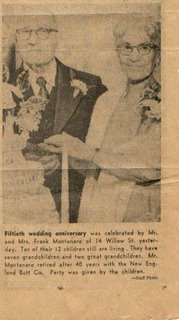Grandma Was a Corker; Grandpa Was No Slouch Either

Before the turn of the 20th century, at the age of 17, my grandmother, Isabella (Corvese) Montanaro left the dirt-poor area of Italy called Caserta, and traveled by boat to the United States. She came here all alone, with a couple of dollars in her pocket, and with no-one here to greet her or to help her. Just imagine, as you fume because the batteries in your remote have expired, just what courage, determination and just plain grit and strength of character that took. She made her way to Providence, RI, where she had heard that there was a factory job she could get. Over the course of several years, she earned and sent back enough money to bring over her parents and all her brothers and sisters; eventually, the entire family emigrated to the USA from Italy.
She met and married Grandpa Franchesco Montanaro, who had come here from the same area of Italy, and probably met her at the Holy Ghost Roman Catholic Church in Providence. In those days, particularly for Irish, French and Italian immigrants, the Catholic Church was a protector and a source of help and comfort along with providing spiritual guidance. Grandpa had found work in a foundry in the Olneyville area of Providence, and together they produced and raised 12 children in the days when a couple usually needed to have several children so that some would survive the terrible childhood diseases that killed many of them. Early in the Great Depression of the 1920’s and 30’s, Grandpa lost his job at the foundry and could find no other work. He then made a wooden pushcart, and supported his family until jobs became available again by purchasing fruit and vegetables at the farmers’ market every morning, and reselling them throughout the neighborhoods. There was no such thing as Welfare in those days.
Meanwhile Grandpa and Grandma Wilcox (Leslie Wilcox and Maude Turner) met in Fairfield Center, Maine, in the far-northern part of the state, she an immigrant from Nova Scotia, and he a native Yankee farmer’s son. They married and went on to raise 6 children, of whom one died as a youngster. They could not feed their family by farming in the area, so they pulled up stakes and moved to Fairfield, Maine, in the middle of the state, where they settled a farm principally growing potatoes and beans for baking.
Over the next few years, Grandpa Wilcox built and rebuilt five houses, mostly by himself, as over and over again chimney fires kept destroying homes he had built. Perhaps Grandpa understood nature and spiritual matters (he became famous in Maine for his faith-healing powers and his ability to foretell the future), but mechanical and scientific matters were not his forte. I remember as a young child Grandpa blowing himself up in the methane pit out back that fed the gas lights in the house. He shouldn’t have lit that match. I also remember seeing, when I was a child, that when an automobile or a truck stopped running, he would hitch a team of horses to it, pull it into the woods, and then go and get another one.
In the height of the same depression that put Grandpa Montanaro behind a fruit peddler’s pushcart, potato farmers could no longer sell their crops. This was in the days when disconsolate farmers died their potatoes blue to take them off the market in a desperate (and unsuccessful) attempt to raise prices above their costs. (Dairy farmers were also pouring milk down the drain for the same purpose.) Grandpa then hired out his team and himself and his sons to the railroad to pull and place railroad ties on new rail beds throughout Maine, and both he and Grandma became undertakers, laying out and dressing the dead for immediate funerals or for temporary storage in frozen vaults. At the same time, of course, all their vegetables, butter, eggs and preserves were home grown and home made.
The point of all of this is not to belittle the comforts and affluence of modern life, but to point out with pride the stuff my children and grandchildren should know they are made of; and to remind them that others have proven over and over again that almost any obstacle can be overcome if you don’t ever give up or give in – and that there is always an answer somewhere if you look hard enough for it.



2 Comments:
Great story, Russ!
Once again, thanks for sharing!
I wish children today had some concept of how tough it was in the past.
Post a Comment
<< Home